Moss Farm & Moss Laboratory
As pioneers in the application of moss, our focus has always been on these unassuming superplants.
There are approximately 16,000 to 20,000 species of moss worldwide, found from polar regions to deserts. Green City Solutions has established the world’s first vertical moss farm in Bestensee near Berlin for the purpose of moss cultivation. Here, moss grows on approximately 1,200 square meters in the form of innovative moss mats. The moss researchers at Green City Solutions are constantly striving to find ever-better species and mixes of moss for air purification and refreshing purposes.
In nature, mosses require about four years to grow into a dense, lush green moss surface.
In the moss farm, these superplants now grow about 16 times faster than in nature under controlled and optimal conditions!
Through special cultivation and ideal supply conditions, the growth time in the moss farm has been reduced to 12 weeks.
Sustainability is also a priority in the fully digitized moss farm. The use of water, heat, and electricity is sensor-monitored and optimally controlled.
The mosses are robust and reusable—after a stint in the moss farm, they can purify air for another six months before returning to the farm.
Photos: GCS
Mosses are capable of amazing feats and are highly adaptable. However, in the midst of a city, on a busy square, or next to a heavily trafficked road, these small plants need our support to remain vital and efficient in the long term. The moss modules are the technical shell that ensures the natural abilities of the mosses are enhanced and that their vitality is maintained even under stressful conditions such as heat, drought, and intense air pollution.
With a specially developed bio-algorithm, it is ensured that the mosses are supplied according to weather influences and other factors such as local air quality. Using more than 30 built-in sensors and a connected analysis database, factors such as ventilation and irrigation are controlled so that the mosses are always well-cared for and can fully concentrate on filtering and refreshing the city air.
The heart of our natural air coolers and filters is the moss module, in which up to 4 m² of moss grows. According to the Leaf Area Index (LAI), this area corresponds to an active and cleaning moss surface of 100 m².
Once placed in the moss modules, the specially developed bio-algorithm ensures that the mosses are optimally supplied. This allows them to theoretically remain in the biofilters indefinitely. We are working on perfecting the algorithm to make this a reality. Currently, we replace the moss mats depending on the location about once or twice a year to ensure optimal performance and health of the mosses. The replacement also serves to revitalize the mosses in our moss farm. There, they regenerate under optimal conditions and are then prepared for new deployments, allowing for reuse.
How beautiful and doubly refreshing it is when these high-performance plants continue to “outgrow” themselves in our fresh air concepts in the field, as seen here in one of our CityBreeze in the Müggelpark Gosen shopping centre:

Photo: GCS
The mosses in our natural biofilters not only purify the air: they are small sponges capable of storing enormous amounts of moisture, making them an ideal component of rainwater management and contributing to increased quality of stay. The water not only supports moss vitality but also noticeably cools the surrounding air through natural evaporation.
These regenerative and natural filters perform this function in Müggelpark Gosen, where particularly in the summer months, problems with significant heat buildup and air quality inside the shopping center existed due to the glass roof.
Furthermore, the CityBreeze offers an added value: with the help of climAD, it provides advertising with a benefit, as the integrated efficient screen reflects sustainability for outdoor advertisers and advertising clients.
Photos: GCS




